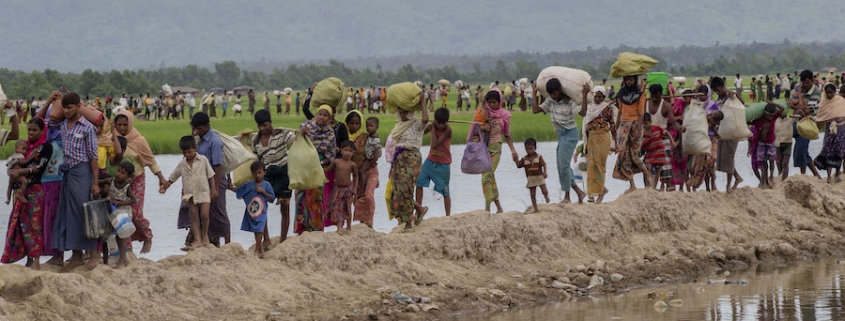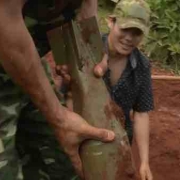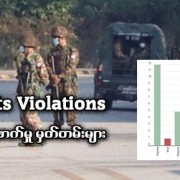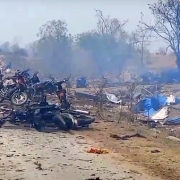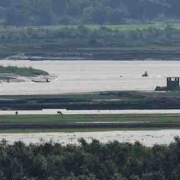Argentine court hears allegations of genocide against Myanmar leaders
Universal jurisdiction case to review accounts of rape and slaughter of Rohingya.
Updated at 10:30 p.m. EDT on June 7, 2023.
An Argentine court is hearing testimony about allegations of genocide and crimes against humanity committed by senior Myanmar officials against Rohingya Muslims in a landmark case.
The hearing is being held in Argentina under the principle of “universal jurisdiction” enshrined in the country’s constitution, which holds that some crimes are so heinous that alleged perpetrators thousands of miles away can be tried.
“This is a historic fight for justice,” said Tun Khin, president of the London-based advocacy group Burmese Rohingya Organisation UK, or BROUK, which filed the complaint with the Federal Criminal Correctional Court in Buenos Aires in 2019.
“Holding the military accountable for genocide of the Rohingya will benefit everyone in Burma,” he said.
The week-long hearing will call witnesses to testify before federal prosecutor Guillermo Marijuan, who is gathering evidence in the case.

The 46-page criminal complaint centers on violence in 2012 and 2018 that drove about 1 million Rohingyas from Myanmar, mostly to neighboring Bangladesh, where many live in squalid refugee camps to this day.
In harrowing detail, the document describes rapes, beheadings and the slaughter of Rohingya civilians committed by Myanmar’s military, known as the Tatmadaw, and their civilian supporters.
It describes “the gang rape of women, girls and boys” and includes “the virtually total destruction of their towns and villages by intentionally setting them on fire.”
Goal: Arrest or extradition
Ultimately, the complaint calls for the perpetrators to be identified “and the necessary measures be adopted” for them to be interrogated by a judge, “including their arrest and/or extradition if necessary.”
“The idea is that someone will be caught and brought trial. It forms part of a longer arc of accountability and truth-telling,” said Akila Radhakrisan, head of the New York-based Global Justice Center, a group specializing in human rights and sexual violence against women.

But cases like these can take decades to be resolved, Radhakrisan said.
For example, it was only on May 23 that a key fugitive in the 1994 Rwandan massacre was found in South Africa and arrested following a warrant issued by the United Nations’ International Residual Mechanism for Criminal Tribunals.
The public shaming and a pending arrest warrant for perpetrators in Myanmar could limit their travel, and also deter others around the world that might engage in similar human rights abuses, officials said.
Prosecutor Marijuan is technically still in the phase of collection of evidence.
Aside from the courtroom testimony, evidence includes detailed information collected by a 2017-2019 UN-backed Independent International Fact Finding Mission on Myanmar, which interviewed hundreds of witnesses in Myanmar and Bangladesh.

Those named in the accusation include Senior Gen. Min Aung Hlaing, head of Myanmar’s armed forces and the ruling junta, which overthrew the civilian government in a coup two years ago, senior officials in the police and border guard, and radical Buddhist monks including Ashin Wirathu.The accusation also names pro-democracy icon Aung San Suu Kyi, the de facto head of Myanmar’s civilian government between 2016 and 2021, as being complicit in the genocide. Removed from power in the coup, she is now serving a lengthy prison term in Myanmar on charges that supporters say are politically motivated.Anonymous testimonyFearing retaliation from agents of Myanmar’s military government, witnesses coming to court have taken strict measures to remain anonymous. The hearings are being held behind closed doors. The Rohingya are represented in court by Tomas Ojea Quintana, an Argentine attorney who has served as U.N. Special Rapporteur on human rights in Myanmar between 2008 and 2014.Argentina has held previous cases about alleged crimes committed elsewhere.A 2010 case examined crimes committed in Spain during 1939-1975 fascist rule of Francisco Franco; a 2014 case against Israeli authorities for crimes against humanity in the Gaza Strip; and a 2018 case against Saudi Arabia’s Prince Mohammed bin Salman for crimes against humanity committed in Yemen.

